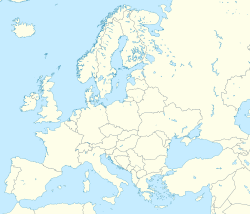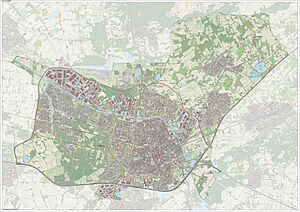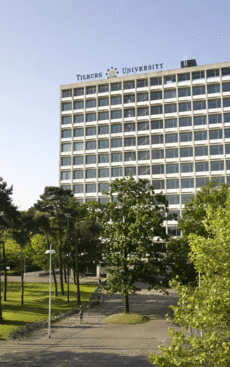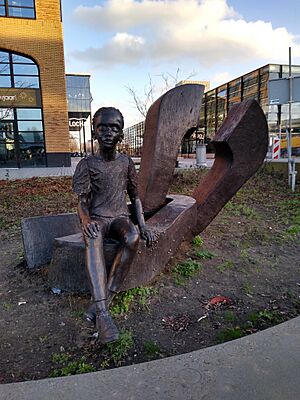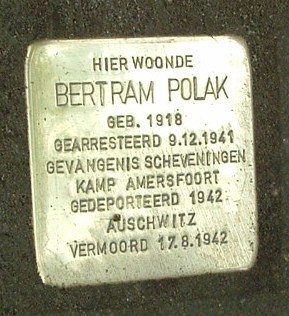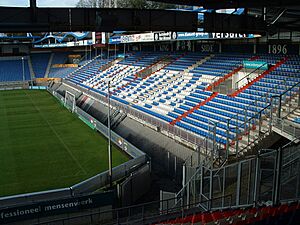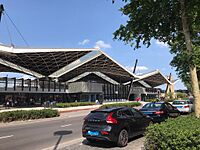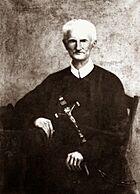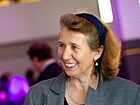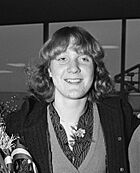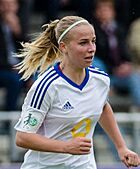Tilburg facts for kids
Quick facts for kids
Tilburg
|
|||||
|---|---|---|---|---|---|
|
City and municipality
|
|||||
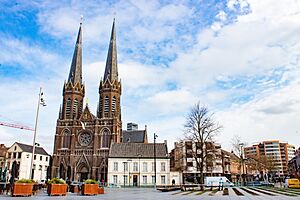
The Heuvel, a central square being overlooked by the Heuvelse kerk
|
|||||
|
|||||
| Country | Netherlands | ||||
| Province | North Brabant | ||||
| Government | |||||
| • Body | Municipal council | ||||
| Area | |||||
| • Municipality | 119.18 km2 (46.02 sq mi) | ||||
| • Land | 117.29 km2 (45.29 sq mi) | ||||
| • Water | 1.89 km2 (0.73 sq mi) | ||||
| Elevation | 14 m (46 ft) | ||||
| Population
(municipality, May 2014; urban and metro, May 2014)
|
|||||
| • Municipality | 210,289 | ||||
| • Density | 1,793/km2 (4,640/sq mi) | ||||
| • Urban | 233,339 | ||||
| • Metro | 300,249 | ||||
| • Metro region | 553,706 | ||||
| • Brabant metropolitan area | 1,944,588 | ||||
| Demonym(s) | Tilburger | ||||
| Time zone | UTC+1 (CET) | ||||
| • Summer (DST) | UTC+2 (CEST) | ||||
| Postcode |
5000–5049, 5056, 5070–5071, 5074
|
||||
| Area code | 013 | ||||
Tilburg is a lively city and municipality in the southern province of North Brabant, Netherlands. It is a big city, with a population of over 229,000 people as of January 2024. This makes it the second-largest city in North Brabant, right after Eindhoven. It is also the seventh-largest city in the entire Netherlands.
Tilburg is a hub for learning, home to Tilburg University, Avans University of Applied Sciences, and Fontys University of Applied Sciences. The city has three railway stations: Tilburg, Tilburg Universiteit, and Tilburg Reeshof. The "Spoorzone" area, which was once a train maintenance yard, is now being turned into a modern city space.
Contents
History of Tilburg
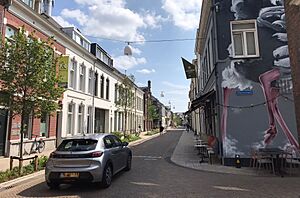
Not much is known about how Tilburg first started. The name Tilliburg was first seen in old papers from the year 709 AD. For many centuries after that, the name wasn't mentioned. In the Middle Ages, Tilburg was more of a region than a single town. People lived in small groups of houses called hamlets. One of these was called "Eastern Tilburg." This hamlet had a small castle on a hill, but it was later taken down.
In the 14th century, Tilburg became a "manor," which was like a large estate. It was known as "The Manor of Tilburg and Goirle." Important lords owned these rights and collected money from the villagers.
In the 15th century, one of these lords, Jan van Haestrecht, built Tilburg Castle. This castle was later taken down in 1858 to build a factory. But its name lives on in the city's coat of arms. Around 1995, the castle's foundations were rebuilt where it once stood. In 1809, Tilburg officially became a city. At that time, about 9,000 people lived there. In 2009, Tilburg celebrated its 200th birthday as a city.
Tilburg: The Wool Capital
Tilburg grew up around special triangular areas where roads met. These areas were used for sheep to graze. You can still see this shape in many parts of Tilburg today. Farmers in these areas decided to weave the wool from their sheep instead of just selling it. Soon, many homes had a loom for weaving. By the 17th century, there were about 300 looms in homes.
Smart business people, called "drapers," gave the weavers the materials they needed. This led to the first wool factories in Tilburg. The wool industry grew very quickly. By 1881, Tilburg had 145 wool mills! People from far away knew about Tilburg's wool textiles.
After World War II, Tilburg was still known for its wool. But in the 1960s, the industry started to decline. By the 1980s, most wool mills had closed. Today, Tilburg has many different types of businesses. The main focus is now on transport and logistics, with other industries close behind.
Modern Changes
When the wool industry ended in the 1960s, the mayor of Tilburg, Cees Becht, made many changes. Sadly, some old and important buildings were torn down. For example, the Koningswei area was replaced by Koningsplein. The old city hall, which was a national monument, was also demolished to build a new, modern building. Even the old railway station was replaced. Because of these changes, Mayor Becht was sometimes called "Cees the Demolisher."
In the 1980s, many old factory sites were turned into new housing areas. The Heuvel, an important square, had a famous lime tree that was cut down in 1994 for a bicycle parking area. This caused many protests because the tree was healthy. Later, new lime trees were planted, but they did not survive.
In the 1990s, Tilburg started to build taller buildings. Three buildings are now considered skyscrapers in the Netherlands: the Interpolis headquarters, the Westpoint Tower, and StadsHeer. The Westpoint Tower is 143.1 meters tall and was once the tallest residential tower in the Netherlands. The 'StadsHeer' is sometimes called "The Bird Cages" because of its unique balconies.
King William II and Tilburg
King William II (1792–1849) really loved Tilburg. He once said he felt "happy" and could "breathe freely" there. The King always supported Tilburg. He helped improve sheep farming, built new farms, and even started a cavalry barracks. This barracks is now a historic building for the City Archives.
King William II wanted his own home in Tilburg. He ordered a palace to be built as his country residence. Construction began in 1847 and was finished just before he passed away in 1849. Today, this palace is part of Tilburg City Hall. In 1987, a monument was put up to remember King William II. The local football team, Willem II Tilburg, is named after him.
Tilburg's Neighborhoods
Tilburg Centrum
Tilburg Centrum is the city's downtown area. It has most of the shops, hotels, restaurants, and cafes. In 2008, the Pieter Vreedeplein square was updated, adding more shopping options. The main Tilburg railway station is located here.
Oud-Noord
Oud-Noord is north of the railway tracks. It is home to the modern art museum De Pont. A large area around the railway, called the Spoorzone, is being rebuilt. New buildings for Fontys University of Applied Sciences and Tilburg's new main library are being built there.
Oud-Zuid
Oud-Zuid is south, west, and east of downtown Tilburg. Many of Tilburg's tallest buildings are in this area. Important places like the 013 music venue and the Schouwburg theater are also here. The Koningsplein and the Piushaven harbor are part of this district.
Noord
Tilburg-Noord is north of the Wilhelmina Canal. It was built between 1966 and 1974. This area has many apartment buildings, green spaces, and businesses. Streets here are often named after famous musicians. The main shopping center is Wagnerplein. The northern part of this district is still mostly farmland and forests.
Oost
Tilburg-Oost is mainly an industrial area. There are some homes in a small part of the district, but it's mostly for businesses.
Zuid
Tilburg-Zuid is the southernmost district, located between the A58 motorway and the Ringbaan Zuid. The football club Willem II is located here. You can also find the Ireen Wüst IJsbaan, an ice-skating rink, and the main campus of Fontys University of Applied Sciences. Leijpark, one of the city's largest public parks, is also in this district.
West
Tilburg-West was mostly built after World War II. It has many small brick houses and apartment buildings. The Westermarkt is the largest shopping center outside the city center. Many schools and universities, like Tilburg University and Avans Hogeschool, are located here. The district has the Tilburg Universiteit railway station and one of Tilburg's hospitals. The largest mosque in Tilburg, the Turkish Süleymaniye-Mosque, is also here. West is surrounded by forests like Wandelbos and the Oude Warande.
Reeshof
The Reeshof is the newest and westernmost part of Tilburg. It is the largest district by population. The first houses were built in 1980. The district has its own train station, Tilburg Reeshof railway station. The Donge river flows through the district, with a green area called Dongevallei where you can see Highland cattle grazing.
Villages of Berkel-Enschot, Biezenmortel, and Udenhout
These are smaller villages that are part of the Tilburg municipality.
People of Tilburg
How Many People Live Here?
As of July 2021, Tilburg had 222,601 people. The city council expects the population to grow. About 23.3% of the people in Tilburg have a foreign background. This means they or at least one of their parents were born outside the Netherlands.
Where Do People Come From?
| 2020 | Numbers | % |
|---|---|---|
| Dutch natives | 156,496 | 71.2 |
| Western migration background | 26,889 | 12.2 |
| Non-Western migration background | 36,404 | 16.5 |
| Turkey | 8,236 | 3.74 |
| Morocco | 6,223 | 2.83 |
| Netherlands Antilles and Aruba | 5,017 | 2.28 |
| Indonesia | 4,611 | 2.09 |
| Suriname | 3,457 | 1.57 |
| Total | 219,789 | 100% |
| Country/territory | Population |
|---|---|
| 158,270 (70.8%) | |
| 8,106 (3.7%) | |
| 6,100 (2.8%) | |
| 5,077 (2.1%) | |
| 4,333 (2.3%) | |
| 3,315 (1.6%) | |
| 1,159 (0.8%) | |
| Others | 20,811 (15.9%) |
Beliefs and Religions
In 2003, most people in Tilburg were Roman Catholic (60.7%). About 21.7% said they had no religion. Other groups included Dutch Reformed (7.8%), Islam (4.8%), and Reformed (4.4%).
Tilburg's Climate
Tilburg has an oceanic climate, which means it has mild winters and cool summers. It's similar to most of the Netherlands. Thunderstorms happen more often in this part of the Netherlands, up to 31 days a year.
| Climate data for Gilze-Rijen, 1981–2010 normals | |||||||||||||
|---|---|---|---|---|---|---|---|---|---|---|---|---|---|
| Month | Jan | Feb | Mar | Apr | May | Jun | Jul | Aug | Sep | Oct | Nov | Dec | Year |
| Record high °C (°F) | 15.2 (59.4) |
18.2 (64.8) |
24.7 (76.5) |
29.1 (84.4) |
33.2 (91.8) |
34.7 (94.5) |
36.8 (98.2) |
35.8 (96.4) |
33.1 (91.6) |
27.2 (81.0) |
19.7 (67.5) |
15.9 (60.6) |
36.8 (98.2) |
| Mean daily maximum °C (°F) | 5.8 (42.4) |
6.6 (43.9) |
10.4 (50.7) |
14.4 (57.9) |
18.4 (65.1) |
20.9 (69.6) |
23.2 (73.8) |
23.0 (73.4) |
19.4 (66.9) |
14.9 (58.8) |
9.7 (49.5) |
6.2 (43.2) |
14.4 (57.9) |
| Daily mean °C (°F) | 3.1 (37.6) |
3.4 (38.1) |
6.4 (43.5) |
9.3 (48.7) |
13.3 (55.9) |
15.8 (60.4) |
18.1 (64.6) |
17.6 (63.7) |
14.5 (58.1) |
10.8 (51.4) |
6.6 (43.9) |
3.6 (38.5) |
10.2 (50.4) |
| Mean daily minimum °C (°F) | 0.0 (32.0) |
−0.2 (31.6) |
2.1 (35.8) |
3.8 (38.8) |
7.6 (45.7) |
10.3 (50.5) |
12.7 (54.9) |
12.2 (54.0) |
9.9 (49.8) |
6.7 (44.1) |
3.3 (37.9) |
0.8 (33.4) |
5.8 (42.4) |
| Record low °C (°F) | −19.3 (−2.7) |
−20.2 (−4.4) |
−14.2 (6.4) |
−7.3 (18.9) |
−2.3 (27.9) |
1.5 (34.7) |
3.9 (39.0) |
3.9 (39.0) |
0.0 (32.0) |
−6.7 (19.9) |
−10.8 (12.6) |
−17.0 (1.4) |
−20.2 (−4.4) |
| Average precipitation mm (inches) | 70.0 (2.76) |
57.2 (2.25) |
64.1 (2.52) |
46.0 (1.81) |
61.2 (2.41) |
65.8 (2.59) |
75.6 (2.98) |
66.0 (2.60) |
72.4 (2.85) |
75.0 (2.95) |
76.1 (3.00) |
75.8 (2.98) |
805.2 (31.7) |
| Average precipitation days (≥ 0.1 mm) | 17 | 14 | 17 | 13 | 14 | 14 | 14 | 13 | 14 | 16 | 18 | 18 | 182 |
| Average snowy days (≥ 0.1 cm) | 6 | 6 | 4 | 2 | 0 | 0 | 0 | 0 | 0 | 0 | 2 | 5 | 25 |
| Average relative humidity (%) | 88 | 84 | 81 | 75 | 74 | 75 | 76 | 77 | 82 | 86 | 89 | 90 | 82 |
| Mean monthly sunshine hours | 63.1 | 84.5 | 119.1 | 171.7 | 203.8 | 195.5 | 205.9 | 190.2 | 142.0 | 113.4 | 64.2 | 50.1 | 1,603.5 |
| Source: KNMI | |||||||||||||
Tilburg's Economy
For many centuries, Tilburg's economy was all about the wool industry. But after the 1960s, the city worked hard to bring in different types of businesses. This helped Tilburg recover after the wool industry declined.
Today, companies like the chemical company IFF have factories in Tilburg. The Japanese company Fujifilm also came to Tilburg in the 1980s. Insurance companies like Interpolis and CZ have their main offices here. Iris Ohyama has its European offices in Tilburg. Since 2013, the electric car company Tesla has had its main European facility in Tilburg. This facility is for assembling and distributing cars.
Tilburg is also a major center for transport and logistics. This means many companies here specialize in moving goods and providing related services. Tilburg is in a great location, right in the middle of the Benelux countries (Belgium, Netherlands, Luxembourg). It's also on an important transport route between Antwerp/Rotterdam and the Ruhr area in Germany. The 'Waalwijk-Tilburg' region has been one of the top logistics areas in the Netherlands for many years.
Education in Tilburg
Tilburg University
Higher education is very important in Tilburg. Tilburg University attracts students and researchers from all over the world. It has about 13,000 students, and about 8% of them are international students. The university has a great library, museums, and is close to the city center with many cafes. Tilburg University offers programs taught in both Dutch and English.
The university is well-known for its research and teaching. Its economics and business programs are highly ranked in Europe.
Fontys School of Fine and Performing Arts
Tilburg is also home to the Fontys School of Fine and Performing Arts (FHK). This school is part of the larger Fontys Hogescholen. It was formed by combining different art schools that existed in Tilburg before. These included the Brabants Conservatorium, which is one of the nine music schools in the Netherlands.
Fontys School of Arts offers many different programs in music, visual arts, dance, theater, and performing arts. You can study for a bachelor's or master's degree here. The school is located in a building called 'Kunstkluster' in the city center, next to the Schouwburg theater. It even has a Concert Hall.
Culture and Fun in Tilburg
Tilburg is a special city that is part of the Council of Europe's Intercultural Cities program. This means it celebrates different cultures.
Local Drinks
Schrobbelèr is a special local drink. It's a sweet liqueur with a lower alcohol content. It's served cold in a unique glass. The drink started in 1973 when a Tilburg businessman, Jan Wassing, wanted a drink that was easier on his stomach. It's especially popular during Carnival. The name comes from an old textile job in Tilburg called 'Schrobbelaar'.
Another local drink is Peerke's Nat. It has a higher alcohol content than Schrobbelèr. It was introduced when Peter Donders (known locally as Peerke) was honored.
The Koningshoeven Brewery makes trappist beer. It was started in 1884 at Koningshoeven Abbey.
Art in Public Spaces
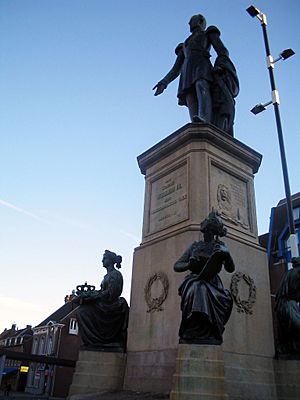
Tilburg has many interesting art pieces outdoors. KORT (Art in Open Space Tilburg) helps support and share information about these artworks. One example is the turning house on the Hasseltrotonde roundabout, which was put up in 2008. KORT also provides details about older artworks, like the statue of King Willem II on the Heuvel.
Festivals and Music
Tilburg is known for its many festivals. These include Incubate, Festival Mundial (which celebrates world cultures), and Roadburn Festival. 013 is a popular modern music venue. Paradox is a club for experimental jazz music. Fontys University of Applied Sciences started a pop music academy, and its students often perform in the city.
Museums to Explore
Tilburg has a famous museum of modern art called De Pont. It shows works by artists like Ai Weiwei and Anish Kapoor. The museum opened in 1992 and is in an old wool mill, which is an important part of Tilburg's history. Anish Kapoor's artwork Skymirror is outside the museum. The SEA Foundation Tilburg is another art place that helps artists from around the world.
Tilburg also has a significant textile museum. It shows the history of textile making in a former factory. It also has a lab where people can design and create new textiles. This museum opened in 1958.
The Natuurmuseum Brabant (Brabant Museum of Nature) is all about natural history. It started in 1935 and moved to its current location near the railway station in 1985. The museum has many stuffed animals, plants, rocks, fossils, and old tools.
The Museum Scryption, which focused on written communication, closed in 2011.
Tilburg City Museum
The Tilburg City Museum (Stadsmuseum Tilburg) doesn't have one main building. Instead, it takes care of the city's historical items and creates exhibitions in different places. For example, you can visit the Peerke Donders Pavilion and Vincent's Drawing Room.
- Vincent's Drawing Room: Here, you can see a recreated room where Vincent van Gogh lived and studied. There's also a modern drawing room with drawing computers.
- Peerke Donders Pavilion: This museum celebrates charity and honors Petrus Donders.
The museum also manages the "Memory of Tilburg," which has over 4400 stories about the city.
Parks and Forests
Tilburg has many parks and forests where people can relax and have fun. The Leijpark and Reeshofpark are the biggest parks. Leijpark is next to St. Elisabeth hospital. Reeshofpark was created in the late 1990s. Older parks like Wilhelminapark are built on former grazing lands.
Compared to other large cities in the Netherlands, Tilburg has the most forest area. Within the city, you can find the Wandelbos forest, the Oude Warande, and the Kaaistoep. Part of Huis Ter Heide, a large natural area, is also in Tilburg. Outside the city, there's a national park called Loonse en Drunense Duinen with sand dunes.
Sports in Tilburg
The local football team is Willem II, named after King William II.
The Tilburg Ten Miles is a yearly running competition held in the city.
Student sports like rowing and hockey are also popular. Tilburg has three field hockey clubs that play in top national leagues.
Tilburg has an ice skating rink called the Ireen Wüst IJsbaan. It includes an indoor 400 m speed skating rink and an ice hockey field. The local ice hockey team, Tilburg Trappers, was very strong in the Dutch league before moving to a German league.
In 2024, bandy (a sport similar to ice hockey) was introduced. A new club, Bandy Vereniging Tilburg, was founded. Three players from Tilburg were part of the Dutch team at the Women's Bandy World Championship in 2025.
Fun Attractions
Tilburg is very close to The Efteling, a famous amusement park. The park, known for rides like Python, is only 11 km from the city center. A small fan-made attraction called Mini Efteling is also nearby. Inside Tilburg itself, you can visit Zoo De Oliemeulen, a small family-run zoo with over 1,000 different animals.
Getting Around Tilburg
Tilburg has three railway stations: Tilburg (Centraal), Tilburg Universiteit, and Tilburg Reeshof. The Tilburg Reeshof station was built to serve the newer Reeshof district. Only the main Tilburg station has intercity trains. A fourth station is planned for Berkel-Enschot, which is becoming more connected to Tilburg.
City and local buses in Tilburg are run by Arriva. The city tried offering free public transport for children and people over 55 from 2005 to 2008.
Tilburg has a great network of bicycle paths called Sternet-Routes. The first path was built in 1975 between the city center and the university. Many new paths have been built since the mid-1990s. Some new tunnels were also built under the railway for bikes.
Tilburg is connected by one main national motorway, the A58 / E312, which goes to Breda and Eindhoven. An outer ring road around the city was finished in May 2012. Other important routes are the A261/N261 to Waalwijk and the A65/N65 to 's-Hertogenbosch. Plans are being made to improve these roads.
Sister Cities
Tilburg has special connections with other cities around the world. These are called sister cities:
 Changzhou, China
Changzhou, China Lublin, Poland
Lublin, Poland Matagalpa, Nicaragua
Matagalpa, Nicaragua Minamiashigara, Japan
Minamiashigara, Japan Same, Tanzania
Same, Tanzania Zemun, Serbia
Zemun, Serbia
Famous People from Tilburg
Artists and Performers
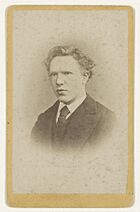
- Gerard van Spaendonck (1746–1822) & Cornelis van Spaendonck (1756–1839), Dutch painters.
- Vincent van Gogh (1853–1890) studied painting at the King Willem II school in Tilburg.
- Guus Meeuwis (born 1972), a popular Dutch singer-songwriter.
- Floor Jansen (born 1981), a Dutch singer known for the band Nightwish.
Thinkers and Public Figures
- Bl. Peerke Donders (1807–1887), a Roman Catholic missionary who helped people with leprosy in Suriname. He was honored in 1982.
- Ernst Hirsch Ballin (born 1950), a Dutch politician and lawyer.
Scientists and Business Leaders
- Franciscus Donders (1818–1889), a Dutch eye doctor.
- Marijn Dekkers (born 1957), a former leader of the company Bayer AG.
Sports Stars
- Jan Pijnenburg (1906–1979), a track cyclist who won a silver medal at the 1928 Olympics.
- Anita Staps (born 1961), a judoka who won a world title in 1980.
- Bas Rutten (born 1965), a Dutch-American actor and former mixed martial artist.
- Jackie Groenen (born 1994), a Dutch footballer and former judoka.
Images for kids
See also
 In Spanish: Tilburg para niños
In Spanish: Tilburg para niños
- Textures
- Jewish Tilburg
- Brabantian
- Villa Mariënhof






